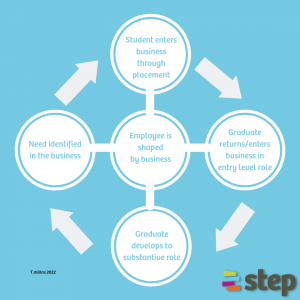An ISE article published in July 2022 boasted that employers are boosting work experience opportunities for the first time since the pandemic.
This is great news for students and graduates who have suffered with a lack of opportunities due to cancelled programmes throughout 2020 and 2021. But the article was clear that a proportion of these work experience opportunities will contain an element of remote working.

The ISE represents around 300 of the largest student employers. Many of these work experience programmes are offered by professional services firms and/or the few very large employers in the construction, engineering and retail fields. So, whilst the ISE’s findings are no doubt indicative of change within the graduate landscape, they do not tell the whole story.
For example, the article goes on to reveal that exposure to senior leaders on these types of programmes has dropped off. This suggests that participants in larger businesses’ structured work experience programmes are not getting the opportunity to work closely with senior leaders. Hardly surprising when you consider the scale of these businesses and the responsibilities of senior leaders within them. Which leads to the conclusion that it may be more beneficial for graduates to consider gaining work experience in other ways.
In reality the majority of employers do not make this kind of investment in structured work experience programmes. And that is OK! At Step we have always focused on Project based, outcome focused, paid internships; rather than short term shadowing / experience.
Anecdotally, we speak to students and recent graduates who have participated in structured summer work experience schemes. They tell us that whilst there is value in the training and mentoring they receive, they often learn little about how to function in the workplace. Many students are left feeling that they have not actually completed any real work of value. The article recommends that students are proactive in asking for more tasks and that they make themselves as helpful as possible. However, this is next to impossible when working remotely or when following a tailored programme.
All work experience is good experience. Whether that be working in retail or hospitality, a call centre, lab or warehouse, everyone can learn something. How to overcome conflict, problem solving, observing and suggesting improvements to processes, timekeeping, communication skills; the list is endless. Students have enough to juggle both practically and emotionally whilst studying, so there is no need to put added pressure on yourself to bag a spot on a coveted blue chip work experience programme. The success rates are relatively low (on average 51 applications per available place), and the rewards for completing the programmes can be disappointing.
And for businesses who do not have the resources to create a formal programme, consider going to the open market to offer meaningful paid work experience opportunities. Think about the work that needs doing in your business, work with your management team to ensure that they are comfortable delegating and supporting a student, and you might be surprised by the results.